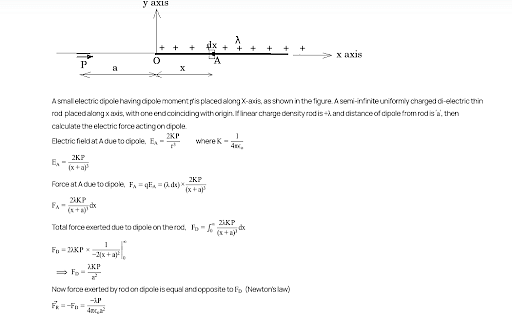Question:
The potential at a point P due to an electric dipole is $1.8 \times 10^5 \, V$. If P is at a distance of 50 cm apart from the centre O of the dipole and if CP makes an angle 60? with the positive side of the axial line of the dipole, what is the moment of the dipole?
The potential at a point P due to an electric dipole is $1.8 \times 10^5 \, V$. If P is at a distance of 50 cm apart from the centre O of the dipole and if CP makes an angle 60? with the positive side of the axial line of the dipole, what is the moment of the dipole?
Updated On: Jul 7, 2022
- 10 C - m
- $10^{-3} \, C - m$
- $10^{-4} \, C - m$
- $10^{-5} \, C - m$
Hide Solution
Verified By Collegedunia
The Correct Option is D
Solution and Explanation
$V = \frac{1}{4\pi\varepsilon_{0}} \frac{ p \cos\theta}{r^{2}}$
Here, $ V = 1.8 \times10^{5} V , \theta =60^{\circ} $
$r =50 \times10^{-2} = 0.5 m$
$ \therefore 1.8 \times10^{5} = 9 \times10^{9} \times\frac{p\cos60^{\circ}}{\left(0.5\right)^{2}} $
or $p = \frac{1.8 \times10^{5} \times0.25 \times2}{9 \times10^{9}} = 10^{-5} C - m $
Was this answer helpful?
0
0
Top Questions on Electric Dipole
- An electric dipole of dipole moment \( \vec{p} = (0.8\,\hat{i} + 0.6\,\hat{j}) \times 10^{-29}\,\text{Cm} \) is placed in an electric field \( \vec{E} = 1.0 \times 10^7\,\hat{k}\,\text{V/m} \). Calculate the magnitude of the torque acting on it and the angle it makes with the x-axis, at this instant.
- CBSE CLASS XII - 2025
- Physics
- Electric Dipole
- An electric dipole of mass \( m \), charge \( q \), and length \( l \) is placed in a uniform electric field \( E = E_0 \hat{i} \). When the dipole is rotated slightly from its equilibrium position and released, the time period of its oscillations will be:
- JEE Main - 2025
- Physics
- Electric Dipole
- An electric dipole of dipole moment \(6 \times 10^{-6} \) Cm is placed in a uniform electric field of magnitude \(10^6\) V/m. Initially, the dipole moment is parallel to the electric field. The work that needs to be done on the dipole to make its dipole moment opposite to the field will be ________________________ J.
- JEE Main - 2025
- Physics
- Electric Dipole
- An electric dipole of dipole moment \( \vec{p} \) consists of point charges \( +q \) and \( -q \), separated by distance \( 2a \). Derive an expression for the electric potential in terms of its dipole moment at a point at a distance \( x \, (x \gg a) \) from its centre and lying:
(I) along its axis, and
(II) along its bisector (equatorial) line.- CBSE CLASS XII - 2025
- Physics
- Electric Dipole
Charges are uniformly spread on the surface of a conducting sphere. The electric field from the center of the sphere in a point outside the sphere varies with distance \( r \) from the center as

- KCET - 2025
- Physics
- Electric Dipole
View More Questions
Concepts Used:
Electric Dipole
An electric dipole is a pair of equal and opposite point charges -q and q, separated by a distance of 2a. The direction from q to -q is said to be the direction in space.
p=q×2a
where,
p denotes the electric dipole moment, pointing from the negative charge to the positive charge.
Force Applied on Electric Dipole
